Monday Feb 16, 2026
Monday Feb 16, 2026
Tuesday, 10 November 2020 00:17 - - {{hitsCtrl.values.hits}}
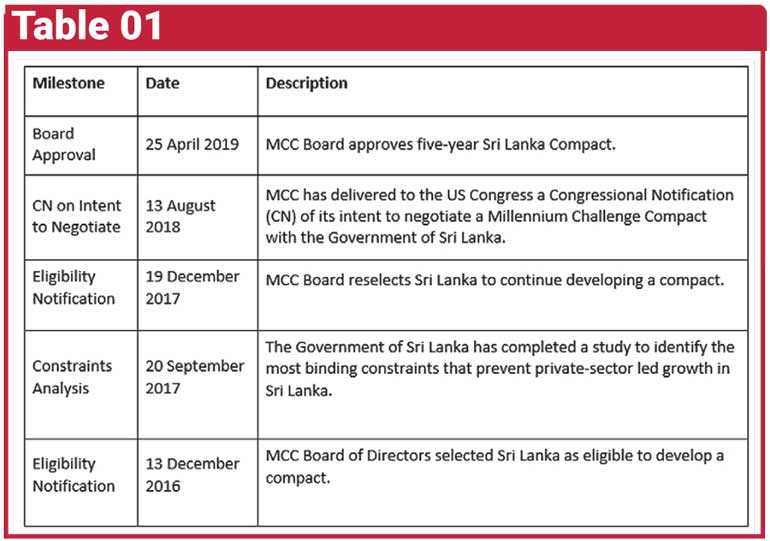
Before we talk about the Millennium Challenge Corporation (MCC), we have to understand why this organisation was set up by the United States in the year 2004. What is the function of this organisation and the other institutions related to MCC and its operations?
When we have to go back to study with common sense we find there are two extremely related agreements we should study in order to realise the MCC. The other two important agreements are the Acquisition and Cross-Servicing Agreement (ACSA) and Status of Forces Agreement (SOFA).
Acquisition and Cross-Servicing Agreement (ACSA)
Acquisition and Cross-Servicing Agreement (ACSA) negotiated on a bilateral basis between the United States and its North Atlantic Treaty Organization (NATO) allies or coalition partners that allow US forces to exchange most common types of support, including food, fuel, transportation, ammunition, and equipment. The agreement does not, in any way commit a country to any military action.
ACSAs diminish logistics burdens and are considered vital logistics enablers by providing on site commanders increased interoperability, enhanced operational readiness and cost effective joint support. The ACSA accomplishes this by establishing a mechanism to provide logistical supplies between two parties in exchange for reimbursement either in cash, replacement in kind, or equal value exchange.
Sri Lanka has already signed the ACSA agreement. JVP MP Bimal Rathnayake revealed details in the Parliament pertaining to a secretive agreement between Sri Lanka and the United States of America. The Acquisition and Cross-Servicing Agreement (ACSA) was first signed in 2007, according to the JVP MP and it expired on 5 March 2017.
Rathnayake noted that the agreement was signed in 2007 in complete secrecy and that neither the Cabinet of Ministers nor the Parliament were aware of it. He also revealed that the agreement was renewed by the administration of President Maithripala Sirisena and PM Ranil Wickremesinghe on 4 August 2017, without informing Parliament.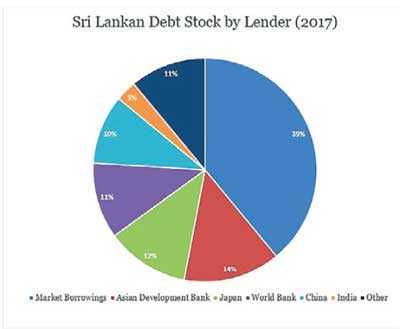
Status of Forces Agreement (SOFA)
A Status of Forces Agreement (SOFA) is an agreement between a host country and a foreign nation stationing military forces in that country. SOFAs are often included, along with other types of military agreements, as part of a comprehensive security arrangement.
A SOFA does not constitute a security arrangement; it establishes the rights and privileges of foreign personnel present in a host country in support of the larger security arrangement. Under international law a status of forces agreement differs from military occupation.
Terms of operation of SOFA
A SOFA is intended to clarify the terms under which the foreign military is allowed to operate. Typically, purely military operational issues such as the locations of bases and access to facilities are covered by separate agreements.
A SOFA is more concerned with the legal issues associated with military individuals and property. This may include issues such as entry and exit into the country, tax liabilities, postal services, or employment terms for host-country nationals, but the most contentious issues are civil and criminal jurisdiction over bases and personnel.
For civil matters, SOFAs provide for how civil damages caused by the forces will be determined and paid. Criminal issues vary, but the typical provision in US SOFAs is that US courts will have jurisdiction over crimes committed either by a service member against another service member or by a service member as part of his or her military duty, but the host nation retains jurisdiction over other crimes. The Status of Force Agreement (SOFA) and Acquisition and Cross Servicing (ACSA) agreements will only be signed if the USA agrees to the points raised by Sri Lanka, Prime Minister Ranil Wickremesinghe said in Parliament on 10 July 2019.
The Prime Minister expressed this sentiment in response to questions raised by JVP MP Anura Dissanayake on SOFA and then Joint Opposition MP Bandula Gunawardene on ACSA agreement with the USA. Finally Wickremesinghe said: “The Government will not agree to anything that would violate Sri Lanka’s sovereignty and territorial integrity.”
Millennium Challenge Corporation (MCC)
The Millennium Challenge Corporation (MCC) is a bilateral United States foreign aid agency established by the US Congress in 2004, that is designed to use a new approach toward foreign aid. MCC is an independent US foreign assistance agency that works to alleviate poverty by providing time-limited grants intended to promote economic growth, reduce poverty, and strengthen institutions.
In the view of its proponents, these investments not only support stability and prosperity in partner countries but also enhance American interests. This is how MCC was explained in their web site under the topic of Sri Lanka compact.
Milestones in Compact Development
If we study the development of the MCC, according to the Milestones in Compact Development of MCC, we can find details with regard to Sri Lanka as seen in table 1.
Is Sri Lanka really a victim of China’s ‘debt trap’?
This is one of the topics largely discussed at different forums. We should see the truth of this too. The two graphs will give the reliable statistics from the Ministry of Finance at the end of 2017 and by the External Resource Department in 2019. If we study the scenarios of our debt we have taken more from the market borrowings and we have taken from other sources too. We have total 10% of Chinese debt and we call that as a debt trap?
We have to do a SWOT analysis with regard to each county and organisation to understand what is the best for us. However with the common sense if we analyse every one of us know the IMF and World Bank gives us loans with conditions.
The IMF and the World Bank are largely owned and controlled by the United States. With Western loans we have to adjust our ongoing functionality and restructure our economy by cutting down social expenditure, devalue our currency, etc. In addition, to service the loans we need to do more exports or attract more Foreign Direct Investments.
Chinese loans comes with no special conditions. This is certainly an advantage for us to develop our economy the way we think what suits us most according to our own resources. The second advantage is we have a greater opportunity to negotiate better terms looking at Chinese requirements too. China means business and they already have the world largest production facilities and they want to sell their products in all parts of the world.
Sri Lanka is a strategically important country not only in the Asian region, but also from a global trade perspective because of her geographical location in the Indian Ocean. Sri Lanka is an island situated at the crossroads of major shipping routes connecting South Asia, the Far East, the Middle East, Africa, Australia, Asia, Europe and America making the country a strategically important for global shipping and logistics.
Even in ancient times, it was evident that Sri Lanka had played a major role in the ancient Silk Rout during the (130 BC) which was a large network of strategically located trading ports connecting the Far East and the West via South Asia and Middle East of the world. Sri Lanka’s natural harbours and nearby towns had been instrumental in anchoring trade ships and for cultural interactions between peoples from different regions in the world.
This was why the strategically significant geographical location and natural harbour facilities of Sri Lanka had been portrayed in several Chinese, Greek, Arabic and Italian manuscripts. Given this historically proven economic significance of Sri Lanka, under the present Belt and Road Initiative, designed based on the ancient Silk Rout network, the Chinese Government has identified Sri Lanka as a key component of the 21st Century Maritime Silk Road.
It looks like we are not using our recourses for our benefit and get the best deals by negotiating good terms for us. China has become the world largest economy by passing the United States. They have become the global giant in manufacturing. In the meantime they need Sri Lanka as an important geographical as well as a geopolitical location for their business development across the world as one of the most strategic points.
Sri Lanka has the highest potential to become a regional or global consolidation hub. If you see the Chinese loans around the world they have given even as interest-free loans to countries like Africa. Why are we not capable of negotiating good rates having strong political and trade relationship over the years, for example the historic Rubber-Rice Pact (1952), maritime agreement between China and Sri Lanka (1963), Signing of bilateral investment promotion and protection treaty (1986)?
When we are negotiating I do not see us using all our cards to negotiate good deals for our benefit or may be the negotiators would have negotiated for their own personal benefit rather than for the country.
Even in the case of loan settlements we were not successful in negotiating anything for our advantage and we always committing we will somehow pay. If our strategy is going to be taking loans even at higher rates and settling the loans, then we will move from bad to worse.
I feel we have to look for SOFA, ACSA and MCC as alternatives to solve our repayment issues.
There are many countries in the world they have developed their economies without much foreign loans using their own resources. Israel and Cuba are two good examples which used their own resources and raw materials and relied on their own people to develop their countries. Sri Lanka is a country that works the other way in most of the cases.
Sri Lankan IT companies have produced world-class products and many countries use our products and software to manage their businesses. When the Sri Lanka Government wants such products, it tries to buy the products from outside of Sri Lanka most of the time.
Is MCC beneficial for us?
MCC is not development aid. This is part of the American Security and defence strategy to protect and defend itself and not any others. This was implemented by George W. Bush and reinforced by President Trump. MCC is all about restructuring our country to the requirements of the United States the way it wants, using SOFA, ACSA and MCC as tools.
We have already signed the ACSA. What the US Government has promised is an outright grant and it does not have to be repaid to the MCC. It is a grant of $ 480 million over five years after the successful implementation. The present Government even before coming to power and the previous Government both said the same: “The Government will not agree to anything that would violate Sri Lanka’s sovereignty and territorial integrity.”
Do we need to become part of the US-China war?
We are a friendly country with most of the countries in the world. We are one of the non-aligned countries which does not want to be officially aligned with or against any major power bloc in the world. The present trade relationship with China and the US was explained by US Secretary of State Mike Pompeo recently as follows:
Mike Pompeo says engagement with China has failed. US Secretary of State Mike Pompeo delivers a speech, titled ‘Communist China and the Free World’s Future,’ signalling a profound shift in US policy. He declares that the era of engagement with the Chinese Communist Party is over, condemning its unfair trade practices, intellectual property theft, human rights abuses in Xinjiang and Hong Kong, and aggressive moves in the East and South China Seas. He calls on Chinese citizens and democracies worldwide to press Beijing to change its behaviour and respect the rules-based international order. (23 July)
Do we need to be a part of the US and go against China which was supporting us all the time? In the Human Rights Council in Geneva when United States brought the resolution against Sri Lanka, China, Russia and Cuba came to our rescue and supported us.
If the United States wants to go against China are we going to give our country as the base to fight them? Any Sri Lankan will not like this since we have the bitter experience of three-decade war against LTTE and all of us suffer enough from that incident up to now.
The United States has not ratified some of the United National Conventions and one of the important ones for our territorial integrity is the declaration of the Indian Ocean as a zone of peace.
The question of establishing a zone of peace in the Indian Ocean was included in the agenda of the General Assembly for the first time in 1971, under an item entitled ‘Declaration of the Indian Ocean as a zone of peace,’ at the request of Sri Lanka, later joined by the United Republic of Tanzania.
As a result of that initiative, the General Assembly adopted resolution 2832 (XXVI), by which the Indian Ocean, within limits to be determined, together with the airspace above and the ocean floor subjacent thereto, was designated for all time as a zone of peace. The Assembly also called upon the great powers to enter into consultations with the littoral States of the Indian Ocean with a view to halting the further escalation of their military presence there and to eliminating from the area all bases, military installations and logistical supply facilities, nuclear weapons and other weapons of mass destruction.
The ratification of this resolution is utmost important by the United States when they are talking about the MCC. Under the MCC they talk about alleviating poverty by providing time-limited grants intended to promote economic growth, reduce poverty, and strengthen institutions.
As citizens of Sri Lanka we should be interested in protecting our national interest, sovereignty, independence and territorial integrity.
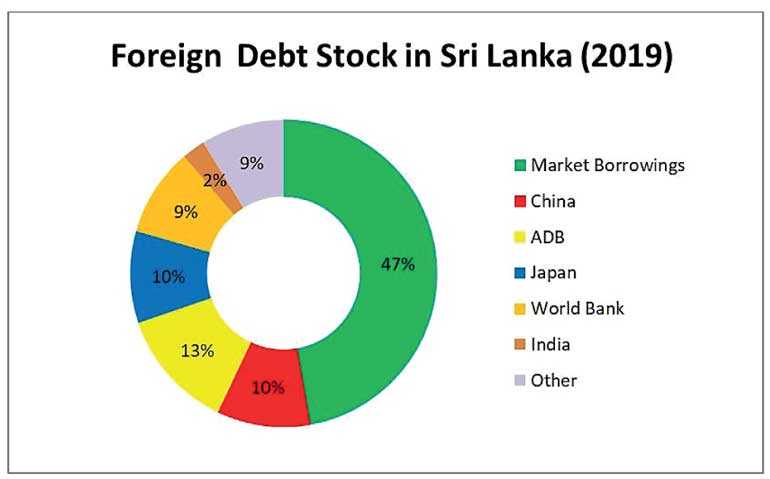
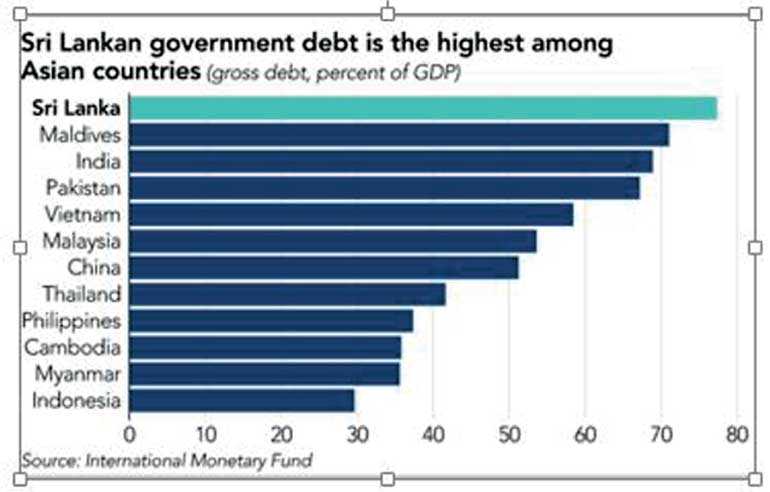
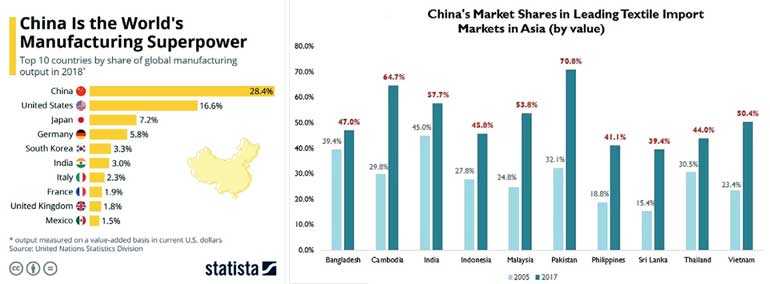
(The writer is an Economics Hons Graduate from the Sri Jayewardenepura University, Immediate Past President of the International Chamber of Commerce and Senior Vice President of the Federation of Chamber of Commerce and Industries Sri Lanka. He can be reached at [email protected])